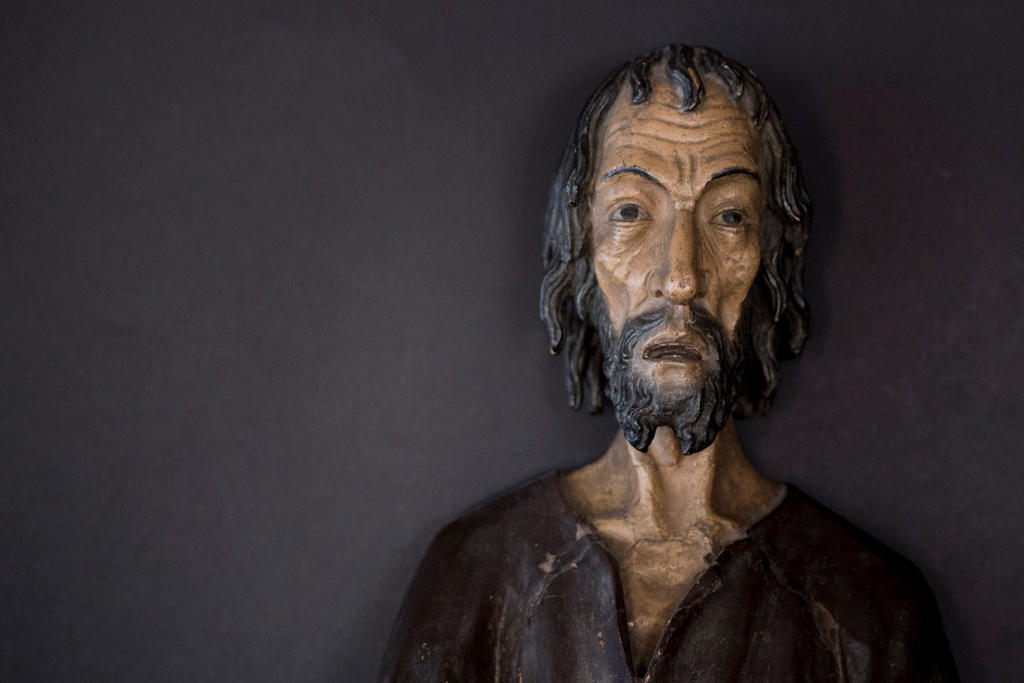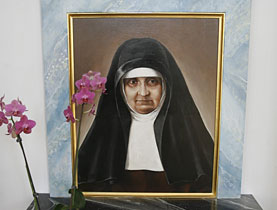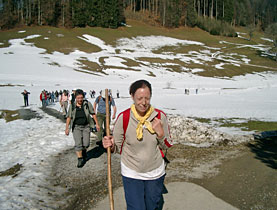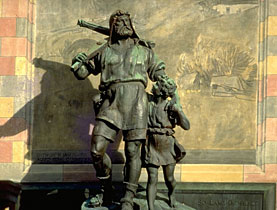The “difficult” life of the Swiss peace saint

Wealthy medieval farmer Nicholas of Flüe shocked his community when he left his family to live as a hermit, but he later became known as the "living saint".
As Brother Klaus, he acted as a mediator between the powerful Swiss cantons, gaining a reputation as a man of peace. Many still make the pilgrimage to the national saint’s birthplace and hermit’s cell, deep in the heart of Switzerland.
It’s 9am in Flüeli, canton Obwalden, around 70 kilometres from Lucerne. Several visitors are already walking around the sites. Some, with backpacks, are on the St James’ Way, the old pilgrimage route to Spain which passes through the hamlet.
With no traffic sounds or hustle and bustle, it seems very peaceful, but locals say that Flüeli can become very busy, with up to 400 people visiting at one time.
Brother Klaus was canonised in 1947 and is Switzerland’s first saint in modern times. The second, Maria Bernarda Bütler, gained the honour in October.
However, the fact that Brother Klaus left his family and is said to have lived for 20 years without food can be perplexing to some.
“Brother Klaus is no ‘easy-going’ saint, rather a ‘difficult one’,” warns an information leaflet on his life. “His story is not easy to understand. We cannot view his life romantically.”
A soldier and then a farmer, Nicholas of Flüe was born in Flüeli in 1417. He later married Dorothea Wyss and they had ten children. His birthplace and the home he built for Dorothea – both lovingly restored – can be viewed in the village.
Personal crisis
Flüe, like his father before him, was a well-respected member of his community, standing in the local government and as a judge. But he felt he had too little time for God. He also found the political machinations of the time distasteful.
“He retreated from all his posts. Then came the inner voice, saying ‘leave everything you love’ and that was for him his wife, children, family and farm – his home,” Father Josef Banz, the Brother Klaus pilgrimage chaplain, told swissinfo.
“It was a terrible distress, we would say today that he became depressed. He sought help from a priest and talked again and again with his wife and they fought through everything together and eventually Dorothea agreed to him becoming a pilgrim. He left at age 50,” Banz said.
On the way to Basel Flüe had a vision which told him to return to Flüeli and live as a hermit on the Ranft, a steep descent into the Melchaa Valley, which adjoins the village.
A short walk takes you down the Ranft to his small wooden cell – there is barely enough room to stand up – which was where Flüe, now Brother Klaus, spent the last 20 years of his life.
Community scepticism
Local people had a difficult time understanding Brother Klaus’s choice and were understandably sceptical of reports that his had not eaten anything since the night near Basel.
Officials were dispatched and confirmed that this was true, said Banz. Brother Klaus’s reputation grew.
Despite his self-imposed isolation, the hermit remained linked to the world. The cell, built next to a chapel, has two windows – one towards the altar and the other towards the outside.
The mystic started to receive a stream of visitors, often important ones from abroad. “I found him informed about everything,” wrote the ambassador of Milan in 1483. This despite the fact Brother Klaus could not read or write.
The Swiss cantons, whose fledgling Confederation was on the brink of civil war, were among those to seek his advice.
Brother Klaus played a decisive role in encouraging the two camps – the country and the city cantons – to agree to the Diet of Stans in 1481, thus averting disaster.
Averting civil war
The treaty helped lay the foundations for the present Swiss Confederation as bonds between the cantons were strengthened.
“We don’t know what advice he gave but the canton of Bern thanked him with a present and Brother Klaus dictated a letter in return which still exists today,” Banz said.
“In this letter, he also talks about his peace philosophy and his experiences of peace in very simple words. And his ideas are just as incisive and useful now as they were then.”
This famously includes the advice to “obey” one another – meaning that parties should listen and respect each other’s needs – and not become involved in other people’s affairs. This early form of mediation is considered one of the founding principles of Swiss neutrality.
It has given him a folk hero status among the Swiss.
Brother Klaus died in his Ranft cell in 1487 and is buried in neighbouring Sachseln. His grave and several relics, including a monastic robe spun by his wife, can be seen in the large parish church which was built in his honour. Sachseln is also where Father Banz has his office.
Dorothea’s contribution – and understanding – has not gone unnoticed. When Pope John Paul II visited the area in 1984 he called her “a woman worthy of saintliness”.
A modern statute, showing Dorothea and some of her children, has since been erected in the church graveyard.
Peace saint
Banz, who takes care of the spiritual side of the pilgrimages, estimates that up to 150,000 people now come each year to pay their respects to Brother Klaus.
Not all are pilgrims – long lost branches of the Flüe family, from as far away as Australia, have also made the journey.
Many people – Banz has given seminars to the Swiss army – are attracted by Brother Klaus’s reputation as a peace saint.
“Many started to really appreciate him after the Second World War because people craved peace so much,” said Banz.
“They realised that here is a man who has worked his whole life for peace and who set down the rules for peaceful relations.”
swissinfo, Isobel Leybold-Johnson in Flüeli-Ranft and Sachseln
Life motto: Brother Klaus lived by “einig wesen” which can be translated as a “mystical union with God” – a desire to bring God and the world together.
Peacemaking: “Peace is forever in God, for God is peace.”
“Obedience is the greatest honour in Heaven and on Earth. Therefore you must strive to obey one another.”
(Brother Klaus, cited in a letter to the Council of Bern, December 1482)
Fasting: according to contemporary sources, Brother Klaus always replied that “God alone knew” why he could endure permanent fasting. His main goal was to give himself up to God, which his why he described it a “privilege” not to eat or drink.
This is one of three swissinfo articles on sites taken from the new book, “Geschichte Erleben in Herzen der Schweiz” (Experiencing history in the heart of Switzerland), published by Switzerland Archaeology.
It contains 135 sites, from prehistoric times to the 20th century, from six central Swiss cantons: Lucerne, Nidwalden, Obwalden, Schwyz, Uri and Zug.
Switzerland Archaeology’s Urs Niffeler told swissinfo the idea for the book came about because there were many “hidden historical gems” that people did not know about in these regions.
The book contains short information on the site and how to get there. It currently exists in German and French and can be obtained via Swiss Archaeology.

In compliance with the JTI standards
More: SWI swissinfo.ch certified by the Journalism Trust Initiative




You can find an overview of ongoing debates with our journalists here . Please join us!
If you want to start a conversation about a topic raised in this article or want to report factual errors, email us at english@swissinfo.ch.